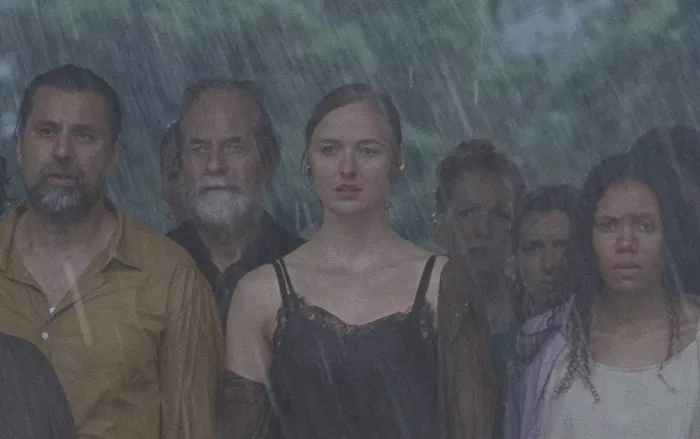In Armand, a mother is urgently summoned to her child’s school for a meeting with teachers that soon spirals into a web of unease, suspicion, and unresolved tension. The Norwegian film, which earned the Best First Feature prize at Cannes last year, unfolds in a confined primary school classroom, crafting a claustrophobic atmosphere that mirrors the anxiety of its characters. Though the film keeps its audience on edge, it ultimately raises more questions than it answers, leaving viewers with a sense of lingering ambiguity.
The plot begins with a conversation between Sunna (Thea Lambrechts Vaulen), a junior teacher, Asja (Vera Veljovic), and the school’s principal, Jarle (Øysten Røger), as they prepare for a delicate meeting. Uncertainty hangs over the discussion — none of them are quite sure of the specifics, whether the situation is innocent or malicious, or how to proceed if they uncover the truth. The tension mounts as they await the arrival of Armand’s mother, Elisabeth (Renate Reinsve), who is completely in the dark about the reason for the gathering. Elisabeth, a once-prominent actress whose career has recently faltered, is understandably anxious for answers, but Sunna is forced to delay, heightening the emotional strain.
The nature of the meeting slowly unravels: Armand’s classmate Jon, a fellow 6-year-old, has allegedly accused Armand of sexual abuse and threats. The two children are not only classmates but also cousins, making the situation even more fraught. Throughout the film, neither Armand nor Jon is shown, and much of the drama hinges on adult interpretations of the children’s words and actions — raising the question of whether young children would even have the vocabulary to express such allegations.
Directed by Halfdan Ullmann Tøndel in his feature debut, Armand is a tense psychological drama that reflects the director’s cinematic lineage—his grandparents are the renowned Liv Ullmann and Ingmar Bergman. The film forgoes conventional character studies in favor of a more fragmented, surreal approach, including two unexpected dance sequences by Elisabeth, which serve as both emotional outbursts and moments of eerie foreboding. These choreographed scenes add an unsettling layer to the narrative, while the sporadic sounding of a fire alarm heightens the atmosphere of dread.
However, it is Elisabeth’s uncontrollable laughter, which breaks out after a lengthy series of tense exchanges, that proves to be one of the film’s most remarkable sequences. This scene, in which Reinsve delivers a breathtakingly intense performance, is an acting tour de force that captivates both the other characters and the audience. Yet, even in moments of catharsis, the film refuses to provide any concrete answers, continuing to swirl in a vortex of unresolved conflict.
Despite its gripping atmosphere and moments of brilliance, Armand feels frustratingly inconclusive. Ideas and narrative threads are introduced but not fully explored, leaving key questions unanswered. Why has Elisabeth stopped working? What is the backstory between Anders (Endre Hellestve), a key character, and Elisabeth? These gaps detract from the film’s overall impact, leaving a sense of underdevelopment even as the film tantalizes with its complexities.
Armand may leave audiences engaged but not entirely satisfied. It’s a promising debut from Tøndel that plays with narrative form and psychological depth, but its refusal to resolve its central mysteries may leave some viewers longing for more closure.
Related topic:
“Sing Sing” Highlights the Power of Redemption and Human Connection in Prison
Legendary and Hasbro to Adapt Magic: The Gathering for Film and TV
‘My Love Will Make You Disappear’ to Premiere in North America

